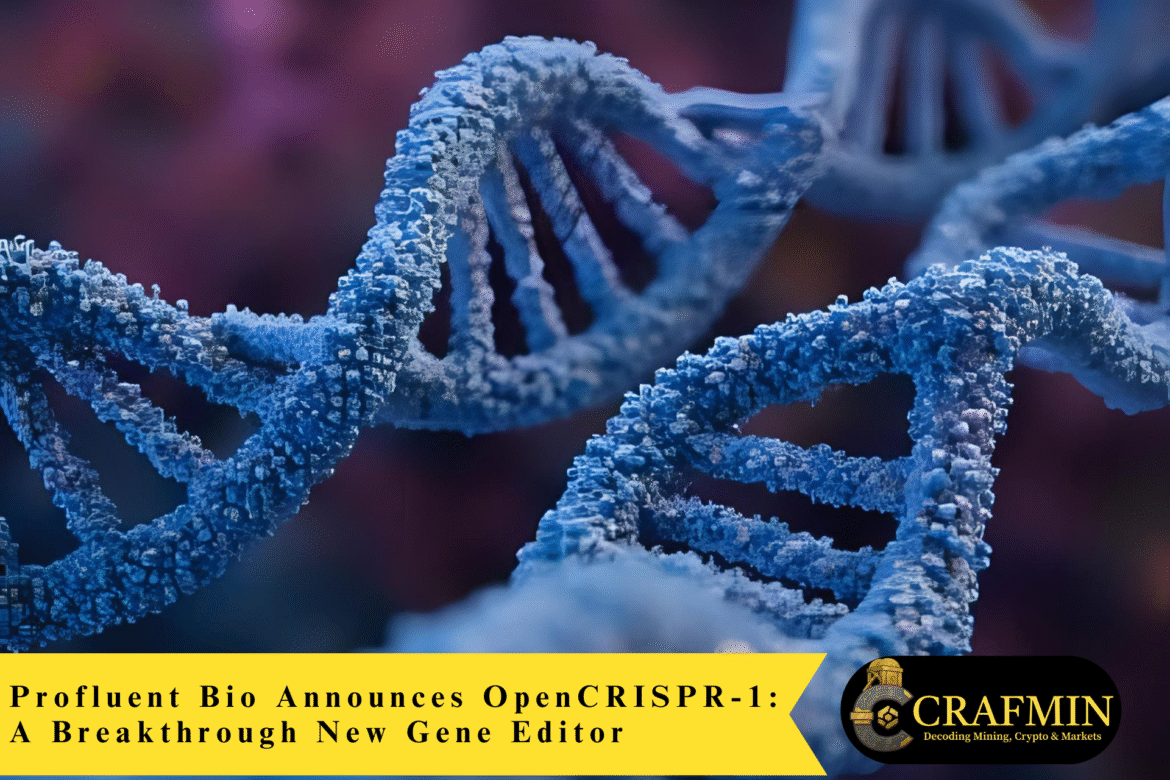A Leap Beyond Nature
Profluent Bio has announced OpenCRISPR-1, a new gene-editing system that is different from any of its predecessors. Unlike traditional CRISPR enzymes that are taken from nature, this editor was not taken from nature. It was designed specifically, and therefore the first of its kind to entirely diverge from evolutionary paths.
What is unique about OpenCRISPR-1 is its groundbreaking construction. The protein has hundreds of mutations over any enzyme that has ever been used previously, a completely new tool in science. To open-source it, Profluent Bio is inviting scientists around the world to study, adapt, and utilize it, an open rather than a hidden resource.
12/@CRISPRTX is also advancing a pipeline of in vivo gene editing programs using lipid nanoparticle (LNP) delivery of Cas9 mRNA and a guide RNA (gRNA) to the liver. $CRSP two leading in vivo programs are CTX310 & CTX320 which aim to reduce expression of ANGPTL3 (CTX310) & Lp(a)… pic.twitter.com/Naj15r6LT7
— Yair Einhorn (@yaireinhorn) August 20, 2025
Moving Beyond Biology’s Blueprint
Instead of mimicking what nature has already accomplished, OpenCRISPR-1 breaks into new territory. It is not a small modification of an existing system but a distinct thing. It is a breakthrough: scientists no longer have to work with only what the natural world has developed, but are able to consciously design the molecular machinery that tomorrow will need.
The transformation runs deep. Biology has been thought of as a book we have read for a long time. Researchers are now authoring entire new chapters in that book.
The Medical Promise
Medical potential is immense. OpenCRISPR-1 potentially could speed up the development of cures, allowing scientists to launch precision attacks on rare genetic diseases tailored to an individual patient. Instead of years of marginal progress, new medicines may be developed much faster.
This potential is exciting but also raises tough questions. What safeguards exist when using a technology with no parallel in nature? Who gets to decide how far such technologies will go? Such debates are not theoretical—they are timely and pressing.
Speeding Up Discovery
The release of OpenCRISPR-1 fits into an emerging tempo of speedy research. Drug development and genetic innovation previously were a trial-and-error exercise that took years. Later attempts, such as experimental work on infectious disease, proved that the process can be radically abbreviated. Principle is now being brought to genetics, and timelines long expended are being sheared down to days or weeks.
This means that the bottlenecks that had restricted research in the past might cease to exist shortly. Instead of waiting for natural systems to reveal their secrets, researchers are now able to create tools precisely as required.
BREAKING: Our CRISPR-GPT paper is out TODAY in Nature Biomedical Engineering @natBME !
We built an AI agent that turns ANYONE into a gene-editing expert in 1 DAY instead of months. An undergrad with ZERO experience achieved 90%+ editing efficiency on their FIRST attempt.
… pic.twitter.com/SYZn3afpfw— CL • Le Cong (@lecong) July 30, 2025
Why This Moment Matters
This is not another biotechnology breakthrough. OpenCRISPR-1 is a larger shift: from adapting existing systems to creating entirely new ones. It’s the difference between repairing old machines and coming up with a new engine.
With this inaugural effort, biotechnology demonstrates that it is on the verge of a bold and innovative period—one where the limits of discovery are no longer established by nature but by human imagination.
Ethical Issues at the Forefront
Along with the scientific breakthroughs come the ethical issues that cannot be ignored. If scientists can create entirely new genetic systems, how do we ensure that they will be employed responsibly? Who makes the choices, and how do we prevent misuse?
Regulators, researchers, and ethicists have to walk hand in hand now. Control cannot be an afterthought when so much is at stake. Transparency, accountability, and global cooperation are all required to make sure that these technologies serve humanity, not kill it.
The heterogeneity of HeLa cell-lines undermines reproducibility.
HeLa cells were obtained without informed consent.
==> Researchers should avoid using HeLa cells unless required by a special justification. pic.twitter.com/6hrmL7HTMu
— Prof. Nikolai Slavov (@slavov_n) August 14, 2025
Collaboration Over Control
By choosing to open-source OpenCRISPR-1, Profluent Bio made one thing clear: this technology belongs to all, not just an elite few. By doing this, it invites all scientists across the world to collaborate and progress faster.
At the same time, it also expands the debate of responsibility. In open access, how can we maintain freedom of innovation and the need for safety and security in harmony? These are concerns that the world of science and society must grapple as a whole.
Designing the Future
The story of OpenCRISPR-1 is bigger than gene editing. It’s a leap from discovery to deliberate design, from letting nature take its course to actively engaging in an active hand in forging new possibilities. The age of biology shaped solely by natural forces is being displaced with an age where human imagination and scientific precision can construct solutions de novo.
This is not only a tool—it’s an indicator of where biotechnology is heading. Medicine, science, and even ethics will be shaped by choices today regarding the use of such tools.
Also Read: Sustainable Electric Mining Equipment: Redefining the Industry’s Future
Final Thoughts
OpenCRISPR-1 is not only another lab innovation. It is a cultural and scientific divide, the start of an era when the building blocks of life are engineered instead of found.
Whether it ushers in a golden age of personalised medicine or provokes fierce debate over limits, one thing is certain: biotechnology has opened a new frontier, and the world remains to be read.

